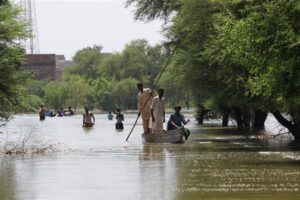Atlantic Council 11 September 2022
More than one-third of Pakistan is underwater amid catastrophic climate change-induced flooding. With over 1,300 deaths, millions displaced, extensive damage to infrastructure, and a surge of water-borne diseases—not to mention the country’s existing political and economic crises—Pakistan faces a long road to recovery.
South Asia Center and other experts provide their analyses of the situation:
Erum Khalid Sattar: It’s a crisis of poverty, inequality, and inequity
The human, economic, and financial costs necessitate a real conversation about climate reparations
The floods in Pakistan have a gigantic human, economic, and financial cost, recovery from which may take years, and has dealt a severe blow to an already precarious economic situation. The floods have largely affected the most underdeveloped parts of the country where poverty and malnourishment are the highest. The floods have affected more than thirty million people, destroyed their livelihoods, destroyed their property, and any sources of income that they had. It is a massive negative shock to the wealth of people in the area, most of whom were already surviving either below or close to the poverty line. The total economic cost of the floods is estimated to be greater than $20 billion, of which roughly half can be attributed to private capital. Effectively, the poorest districts and households in the country have had a negative wealth shock of at least $10 billion, recovery from which may take years. Climate change is real, and it is disproportionately affecting those who have the lowest levels of carbon emissions. It is time for a serious conversation about climate reparations, else any reconstruction which does not account for climate resilience may lead to further more catastrophic disasters in future.
Ammar Habib Khan is a non-resident senior fellow with the Atlantic Council’s South Asia Center. On Twitter: @rogueonomist.
It’s a crisis of poverty, inequality, and inequity
When a calamity like the present floods in Pakistan strike, the images are awe-inspiring and heart-rending. The power of water is literally made visible, whether in its unstoppable gushing strength washing away bridges and buildings, or standing and flooding vast tracts of land—much of it farmland, crops, and farmers’ houses—as far as the eye can see. The images scream at us to pause, to check, and to change our ways. The climate crisis acts primarily through the water cycle but drawing down emissions quickly enough to avert such disasters is no longer a possibility.
At the same time that we recognize these climatic facts, we also need to recognize that it is the poor and the already marginalized—who may earn their livelihoods through agriculture, forestry and fishing—that are the hardest hit. As such, this is also a crisis of poverty, of inequality, of inequity, of injustice. What do the richer, those both within Pakistan and globally, owe the poor of Pakistan at their moment of crisis? We need to use this disastrous flood to think hard about our approach to development and whom it uplifts and how—NOW—before more are sunk in the way of more waters to come during an era of significant climate disruption.
Erum Khalid Sattar is a program director and lecturer of the Sustainable Water Management program at the Friedman School of Nutrition Science and Policy and Institute of the Environment at Tufts University. On Twitter: @erumsattar.
Super floods will exacerbate and expose the gaps and vacuums that afflict ordinary Pakistanis
Prior to the 2022 super floods, Pakistani household incomes had been railroaded by record inflation: a product of Russian President Vladimir Putin’s jihad in Ukraine, Pakistani Trumpism under the leadership of former Prime Minister Imran Khan, and China’s increasing fatigue with the rollercoaster ride Pakistan’s military leadership has taken the country on since 2016.
In the coming months, the world economy is not about to catch feelings for Pakistanis. China is not about to magically renew the third-date mood of the early China-Pakistan Economic Corridor days. Imran Khan will not become easier to get along with, and will only escalate his can’t-miss populism. Where does this leave Pakistan?
Sovereign default and war with India tend to be the big picture doomsday scenarios the West contends with. Pakistani elites have been swatting away those scenarios like flies for decades. The 2022 super floods, however, are a more insidious kind of threat. They will exacerbate and expose the numerous gaps and vacuums that afflict ordinary Pakistanis—food security, inflation, disease, and perhaps least measurable but most potent: misery.
Current Pakistani Prime Minister Shehbaz Sharif has few friends, even within his own party. How well he does in limiting the misery of Pakistanis after the 2022 super floods may help change that. The odds are long.
Mosharraf Zaidi is a founding partner at Tabadlab and a senior advisor at Albright Stonebridge Group. Twitter: @mosharrafzaidi.

